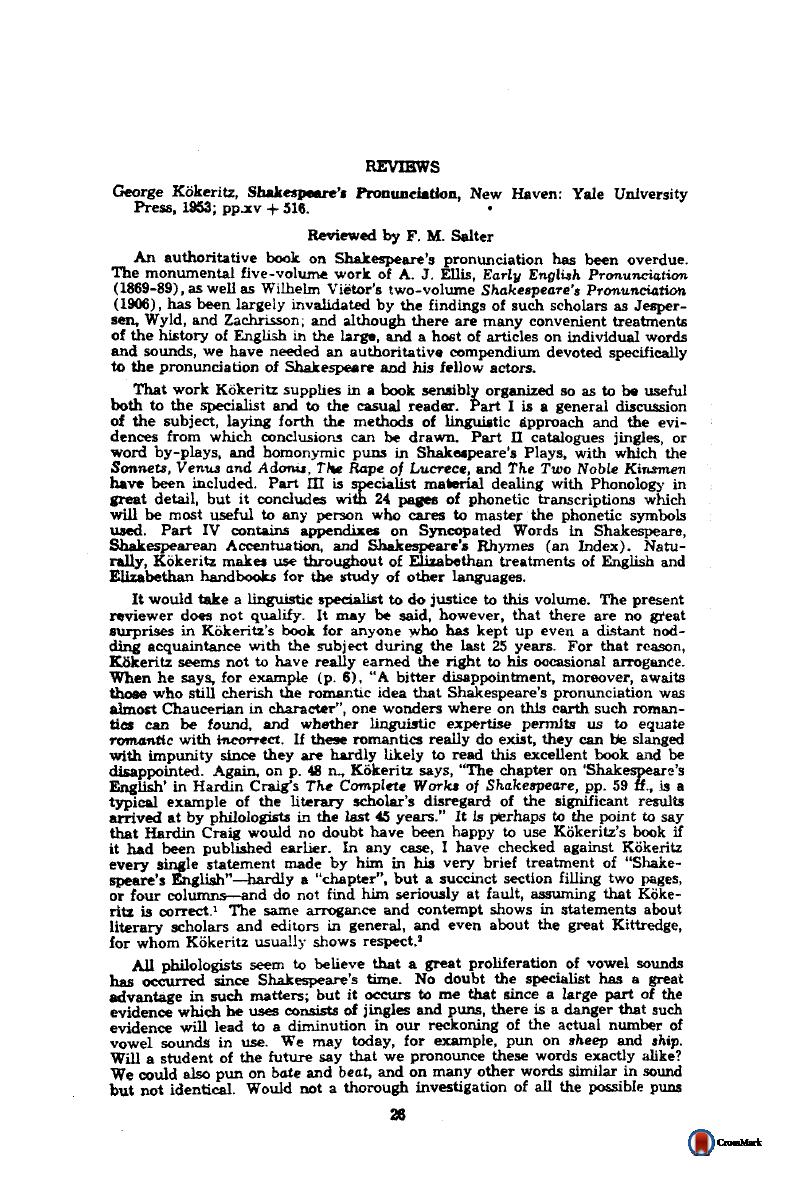No CrossRef data available.
Article contents
George Kökeritz, Shakespeare's Pronunciation, New Haven: Yale University Press, 1953; pp.xv + 516.
Published online by Cambridge University Press: 17 February 2017
Abstract

- Type
- Reviews
- Information
- Canadian Journal of Linguistics/Revue canadienne de linguistique , Volume 1 , Issue 1 , October 1954 , pp. 26 - 28
- Copyright
- Copyright © Canadian Linguistic Association. 1954
References
Notes
1 For example. Hardin Craig says, p. 59, “We could probably understand the spoken English of Shakespeare's time, but the speaker, even when his words were just the ones we would use, would seem to us to be speaking a strange dialect.” Kökeritz says, p. 6, that we “would be able to understand Shakespeare and Burbage with little effort … their speech would probably sound like a quaint dialect” Is there any real difference between these pronouncements?
Craig says. p. 59, “Consonants were in general pronounced as they are now. There were, however, a few differences. The k and g were pronounced in such words as knife and gnaw, and I was sounded in should, would, folk, etc Kökeritz says. p. 295. that the “pronunciation of the consonants was slipshod [but not] appreciably different from our own.” Further, p. 305. “The complete, or almost complete, reduction of initial kn to n at that time is proved by the puns knack-nack, Knave-nave, Knight-night, etc.” (But If puns are the only evidence for this reduction, and especially if some of the puns are not puns, we might demur.) And he quotes Hodges, p. 811, A Special Help to Orthographic, 1643. to the effect that even after Shakespeare's time, I could be retained in words like could, would, etc.
Without submitting the whole of Craig's brief statement to this parallelism. It can be said that he is, according to Kökeritz's own findings correct lr. the main, with minor and trivial differences which only malice or arrogance could quibble about.
2 For example, p. 292 n.: “Kittredge, too, is prone to solve metrical difficulties by the dubious expedient of postulating a disyllabic pronunciation not only of words like worst… His assertion that the vowel was ‘prolonged with a change of pitch, counting therefore as a disyllable’ is nothing but conjecture”
It may be so, but Kittredge does not say these matters are conjectures and one may wonder how Kökeritz found out, Kittredge lived a long life with Shakespeare; how much study, and how far-ranging, lies behind any giver statement of his may itself be a matter for our conjecture. And, if it comes to that even his guesses are likely to be more sound than the painstaking, plodding conclusions of others.
In any case, Kittredge found so many of theie “prolonged” gyUables as to present at least a question for answer. If his answer is not correct. Take Hamlet, I, iii, 8 for example:
Kittredge says, “The metre of this verse is exquisite. Sweet, if dwelt upon in pronunciation, gives the effect of two syllables, since the pitch of the voice will vary in the vowel.” My own feeling is that in these numerous lines where Kittredge finds a prolonged vowel, Shakespeare actually and Intentionally omitted a syllable to create a strong mid-line pause which is properly indicated by Klttredge's punctuation (the dash, above). But the point I am labouring is that Kittredge is deserving of something better than a brusque and contemptuous “brush-off”.




